Great Wine Capitals – International Conference wine, environment and society
The conference on wine, environment and society on 5 November 2019, created by the Great Wine Capitals team with support from many partners in Bordeaux and South West France, offered food for thought on environment, pesticides and climate crisis.
The main conference speakers
The main speakers, Pau Roca, General Director OIV (International Organisation of Vine and Wine) on ‘Global Environment issues and impact on society’, Professor Hans Schultz, Hochschule Geisenheim University, Impact of warming climate on the wine production, and Eric Giraud-Héraud, Research Director Bordeaux ISVV, INRA ‘The impact of consumers requesting wineries to produce “clean and green” wines’ each brought a different perspective.
Pau Roca talked about wine’s place in society as a source of employment, stability and peace. He also mentioned the role of the city and region together in the world of wine- a key part of the Great Wine Capitals success. He stated that organic was not a solution to the environmental issues but didn’t say why but I’m guessing because of lower yield (I have to disagree, we have excess wine relative to demand in the world and less quantity and more quality is the direction the market is heading as we see with the increasing organic part of the market). See my post on why organic farming offers good solutions to many of our crises from more employment to clean water.)
Prof Shultz had a dense presentation that showed us everything from global CO2 emissions to climate change in each of the capitals that form part of the Great Wine Capitals network. He told the crowd that vineyards were a large consumer of fungicides (more than 60% of EU consumption relative to less than 5% of the farmed surface area) and herbicides (significantly higher share than their relative surface share) he also said we could not do without glyphosate.
I have to disagree. With more than 10% of all french vineyards certified organic and therefore not using herbicide it is clear that we can do without glyphosate. Read my post on herbicides here.
Prof Shultz clearly thinks deeply about these issues but as head of a large viticultural university in Germany he also has to tread carefully – Germany’s vineyards are only 3% organic and it is also home to two of the largest agricultural chemical companies in the world – Bayer Crop Science and BASF. ( Geisenheim university has run a comparison of conventional, organic and biodynamic viticulture, with a research project partly funded by the EU, since 2006 with very interesting results- I talk briefly about it here but he didn’t cover this)
In closing Prof Schultz said – was this problem of climate crisis and viticulture a question with too many variables to be able to solve it?
Eric Giraud-Héraud spoke about the effect of labels and their understanding of those labels on consumer behaviour – everday conventional wine, premium wine, organic wine and wine made from resistant varietals. He spoke about copper residues in organic wine being a brake on consumer demand for organic wine in his experiments – I didn’t understand this as analysis shows copper residues in conventional wines are greater then in organic wines (Professor Seralini Research Paper on Copper ). See our article on the facts about copper – the product often used to denigrate organic viticulture.
The panel conference speakers
On the panel with me was MW, Director KEDGE Wine & Spirit Academy, whose presentation addressed areas for further research and education with respect to vineyards, wine and environment – he closed by saying a statement like ‘we can’t solve it’ is not what we need – that people that are depressed cannot create solutions – we need to be positive and look forward using education as a key lever.
Sustainability Manager Vingruppen (Sweden) was up next and addressed environmental labels and the need for a ‘sustainable wine’ label that was wider than organic based on the ‘Better Cotton’ initiative. I think there is a danger in proliferation of ‘environmental labels’ as there is already a lot of confusion for end consumers – see my article on why choose an organic label rather than something like HVE . Caroline Frey, Owner & Oenologist Château La Lagune, a grand cru classé recently certified organic and starting biodynamic certification spoke about their initiatives.
When I took the microphone as part of the panel speakers I picked up the two areas that were my topics under the banner of wine tourism – responsiblity and opportunity – and also went a little off piste to address some of the negative statements about organic from a more grassroots perspective. I include here the key messages I shared in my talk.
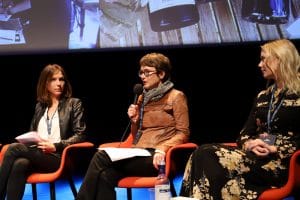
Background to Chateau Feely and their environmental approach
In 2005 my husband and I bought a 14 hectare farm in Saussignac, just over an hour from Bordeaux, with the dream to create artisanal organic wine. Advisors told us organic farming was too risky – only 1% of the French vineyards were organic at the time. We ignored the advice and followed our sense of what was right. Today more than 10% of French vineyards are organic and it is an important and growing part of market.
Saussignac, our commune wine appellation, was already 10% organic when we bought the farm and today it is nearly 50% organic. Its worth taking a moment to look at why people in this small community went organic – the reasons are diverse. At one farm, the family’s 5 year old daughter got lukemia – there was no history of it in the family, their research suggested it was the systemic pesticides they were using on the farm -they went organic. Another farmer’s soil health was the catalyst. Initially his yields had gone up with chemical farming but after more than 20 years, yields fell off despite increased doses of chemical fertiliser. The negative effects of chemical farming on life and health of his soil and the quality of his wines were noticeable. Another farm converted after losing a court case to an employee who experienced long term nervous system disruption as a result of exposure to a systemic pesticide.
Looking around our area the reasons farms converted to organic were not for financial or communication purposes. It was something more fundamental, a deep sense that as farmers we should not poison our land, ourselves and our communities. When you look at a chemically farmed field and at an organic field you automatically, instinctively, choose to have your picnic on the organic field. In covering this critical aspect – our responsibility – I also talked about water – water is life and we cannot drink euros – and the specifics of PAT Gardonne. I mentioned how we started biodynamic methods in 2007 as a way to combat fungal disease and decrease our dependence on copper as a fungicide.
Wine tourism – opportunity
Then I moved back to the core topic which was wine tourism. In 2007 we began offering wine tourism – a gite and visits. By 2011 they were so successful we expanded the activities with a larger tasting room and second gite, aided in part by funding under a rural development programme. In 2013 Chateau Feely won the Best of Wine Tourism Gold trophy for valorisation of environmental practices and education. In 2017 we won a best of wine tourism gold trophy for accommodation at the property. In 2019 Chateau Feely won the Gold trophy for valorisation of environmental practices and education at the first national wine tourism awards.
Environmental action brings opportunity
Ecological actions helped valorise Chateau Feely’s products and brought new or additional revenue– three examples:
- The wine quality is better – we sell our wines for higher prices than when they were non-organic. Selling for a higher price also allowed Chateau Feely to choose to use hand-crafted methods that respect our people and our vines.
- My second book is called ‘Saving our Skins’ because we were able to valorise a waste product (grape skins) because they were organic and that helped to ‘save our skins’ financially.
- In 2008 after 3 years of organic farming, wild orchids came back into the vineyard -beautiful, but also a sign of returning soil health and mycorrhizae. Clients love to see the orchids. But there was – and is- still a lot to do. Claude Bourguignon estimates that if a vineyard has been chemically farmed for 30 years it will take 30 years to get it back to full health. Every year we see a difference.
Responsibility – farming, education and actions beyond farming
- As farmers we are responsible for the health of air, water and soil on our farms and around us, for us and our families but also for clients, neighbours and the wider environment. At Chateau Feely organic and biodynamic farming helps us respect this responsibility.
- Wine tourism at Chateau Feely is a great opportunity to educate.
- On visits – how farming can be done sustainably; what is organic and biodynamic, how Chateau Feely buildings have been constructed in an eco-friendly way, our actions from water saving to renewable energy.
- In the accommodation at Chateau Feely – we share information how to compost, recycling, renewable energy and more
- Chateau Feely offers collection from the station for guests of the accommodation and for visits of a half day or more – so guests can use public transport and Chateau Feely offers bicycles for accommodation guests.
- Other specific actions taken at Chateau feely outside of farming organically and biodynamically and education.
- We use a renewable energy supplier.
- We save all the water from the roof runoff.
- We grow almost all the vegetables and a lot of the fruit for the family and also for the tasting room.
Conclusion – environmental action and wine tourism
Over the last 15 years of organic farming and wine tourism I have learnt that it is important to follow your intuition for what is right – rather than what looks more profitable on paper. Doing what’s right for the planet provided benefits beyond expectations at Chateau Feely. Success is not about more – particularly not more at the expense of more pollution and pesticides. We get a great sense of satisfaction from seeing the transformation of our farm health.
As winegrowers offering wine tourism, we are in a unique position to share information about farming and the environment with clients. With climate crisis it is ever more urgent to keep learning and sharing as winegrowers and to educate visitors. Our current environmental challenges are an opportunity and a responsibility. To learn more about organic and biodynamic please visit our online organic and biodynamic trail.
*****************
Find out more about Feely wines and buy Feely organic wines online. See our series on why organic and read more about biodynamics. visit to Chateau Feely in South West France ; stay with us or do a multi day course or multi day tour . Chateau Feely also offers wine school including WSET certified courses. Join our mailing list to receive our seasonal newsletter, wine school, events, wine pairing, recipes and more info on this topic at the bottom right of this page.


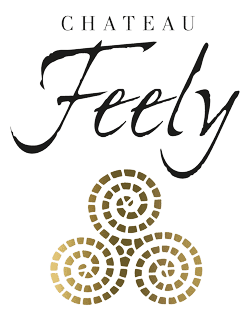




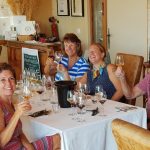
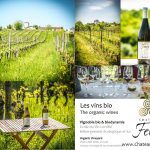
Brilliant Toots! Will you be using this speech in Japan?
Thanks Lyn – not as a speech but we’ll have plenty of business meetings to share the information. Thank you!
You make the link between wine tourism and learning about the environment, the countryside, climate and renewables very well
Thanks Liz